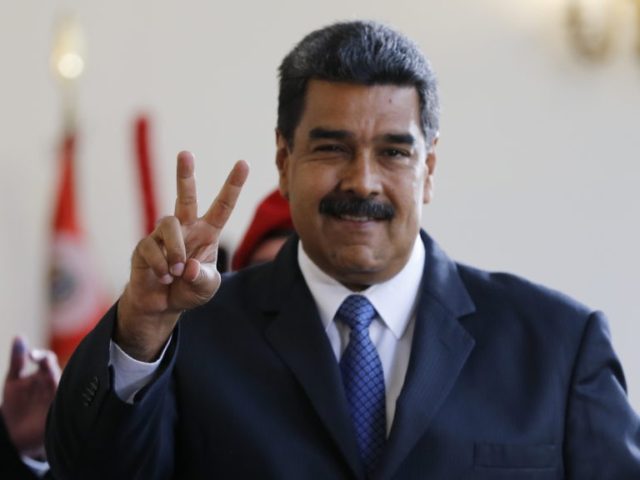Members of the international community overwhelmingly rejected the fraudulent election in Venezuela on Sunday, despite socialist dictator Nicolás Maduro claiming victory with supposedly over two-thirds of the vote.
On Sunday evening, the Maduro-controlled National Electoral Commission (CNE) announced that Maduro had supposedly been “re-elected” with 67.6 percent of the votes.
The commission claims that turnout was around 48 percent, yet The Lima Group, a coalition of democratic nations in the Americas that oppose the Maduro regime, confirmed that their observers found that 82.96 percent of eligible voters did not participate.
“Democracy is the path,” Maduro wrote on Twitter. “Today, the Venezuelan people has demonstrated it to the world. Today has been a historic day for our country. I am and will be President of all and every one of the Venezuelans. Know that you all count on me.”
Democracy is the path. Today, the Venezuelan people has demonstrated it to the world. Today has been a historic day for our country. I am and will be President of all and every one of the Venezuelans. Know that you all count on me. #GanóVenezuela pic.twitter.com/7WV2zvYEDm
— Nicolás Maduro (@maduro_en) May 21, 2018
The victory was inevitable given his regime’s widespread use of voter fraud and manipulation, as well as the fact that the main opposition candidates were banned from running.
Maduro victoriously waving to an empty plaza yesterday is the perfect metaphor for the Venezuelan presidential election. His new term ends in 2025. pic.twitter.com/UO8Iwugki3
— Hannah Dreier (@hannahdreier) May 21, 2018
His main opposition candidate Henri Falcón, a former ally of Maduro’s predecessor Hugo Chávez, was the first to say he did not recognize the result.
“We do not recognize this electoral process as valid,” he said. “We have to have new elections in Venezuela.”
Major international powers including the United States, Canada, and the European Union, as well other regional powers such as Chile and Panama, all rejected the results, with some threatening additional sanctions in response.
Sen. Marco Rubio (R-FL), who has worked closely with the Trump administration on the subject of Venezuela, was the first U.S. official to respond.
“Until a constitutional and democratic order is restored in Venezuela, the Maduro regime should face increasing isolation from the international community,” he said. “I now fully support President Trump’s position that all policy options to help return Venezuela to a path of democracy should be considered.”
After today's "elections", all policy options to return democracy to Venezuela should be considered: https://t.co/HspkRLOjPa pic.twitter.com/7eQYuxTAfJ
— Senator Rubio Press (@SenRubioPress) May 21, 2018
“Venezuela’s electoral process has not respected the most basic democratic standards,” tweeted Spanish Prime Minister Mariano Rajoy. “Spain and its European partners will study appropriate measures and continue to work to alleviate Venezuelans’ suffering,”
En el proceso electoral de Venezuela no se han respetado los mínimos estándares democráticos. España estudiará junto a sus socios europeos las medidas oportunas y seguirá trabajando para paliar el sufrimiento de los venezolanos. MR
— Mariano Rajoy Brey (@marianorajoy) May 21, 2018
“The government of the Republic of Panama does not recognize the results of the elections held this Sunday, May 20, in the Bolivarian Republic of Venezuela, for not considering the process as democratic or participatory,” read a statement issued by the Panamanian government.
Chile’s recently elected President Sebastian Piñera also described the ongoing situation in Venezuela as a tragedy, with his government issuing a statement that the election “lacks any legitimacy and does not meet any of the minimum and necessary requirements to be a democratic and transparent election in accordance with international standards.”
The only regional countries to congratulate Maduro on his success were Cuba and Bolivia, both of whom have developed close ties with Venezuela as part of a left-wing alliance. Maduro held the election on May 20, Cuban Independence Day.
Although Maduro will now return to office for another six-year term, the election is only likely to further weaken his regime, as the threat of additional economic sanctions will likely to cripple a country suffering the worst economic and humanitarian crisis in its history.
Follow Ben Kew on Facebook, Twitter at @ben_kew, or email him at bkew@breitbart.com.

COMMENTS
Please let us know if you're having issues with commenting.